2023年河南省人教新目标(Go for it)版中考英语二轮专题复习:专项3 代词(73张ppt)
文档属性
| 名称 | 2023年河南省人教新目标(Go for it)版中考英语二轮专题复习:专项3 代词(73张ppt) |  | |
| 格式 | zip | ||
| 文件大小 | 417.4KB | ||
| 资源类型 | 教案 | ||
| 版本资源 | 人教新目标(Go for it)版 | ||
| 科目 | 英语 | ||
| 更新时间 | 2023-03-23 20:43:14 | ||
图片预览

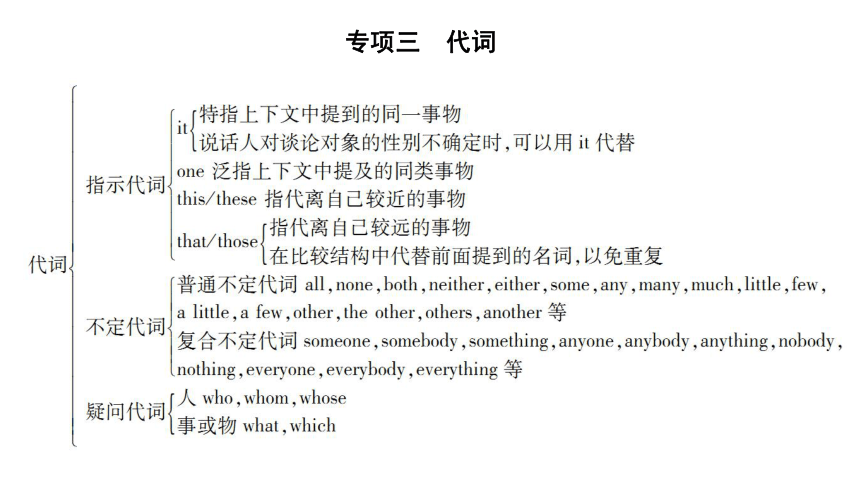
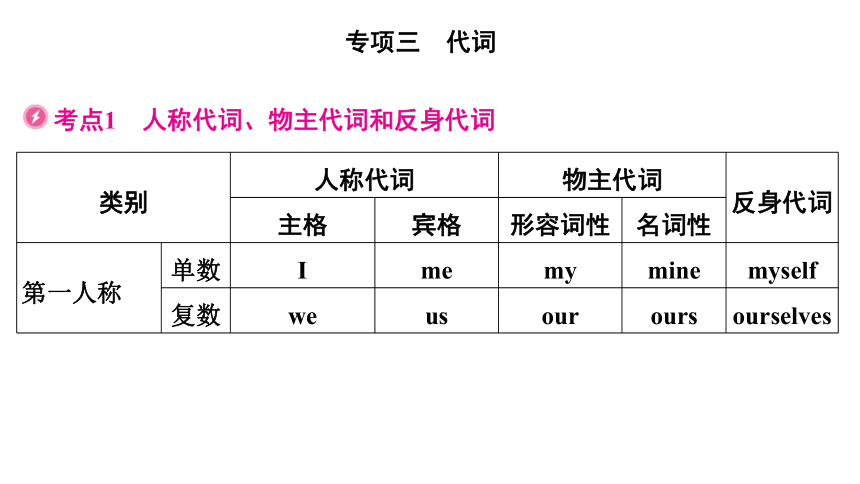
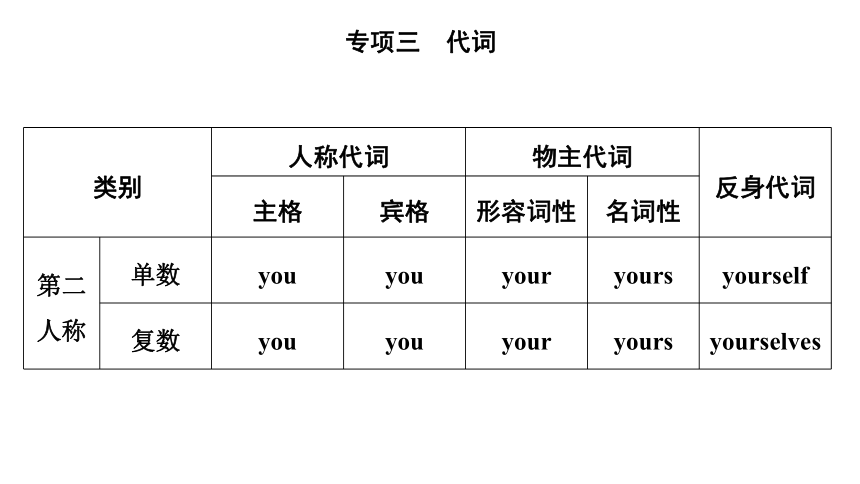
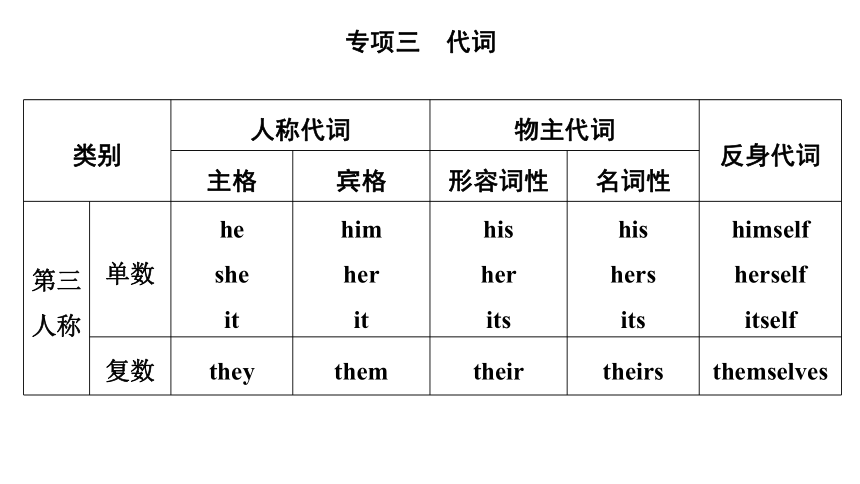
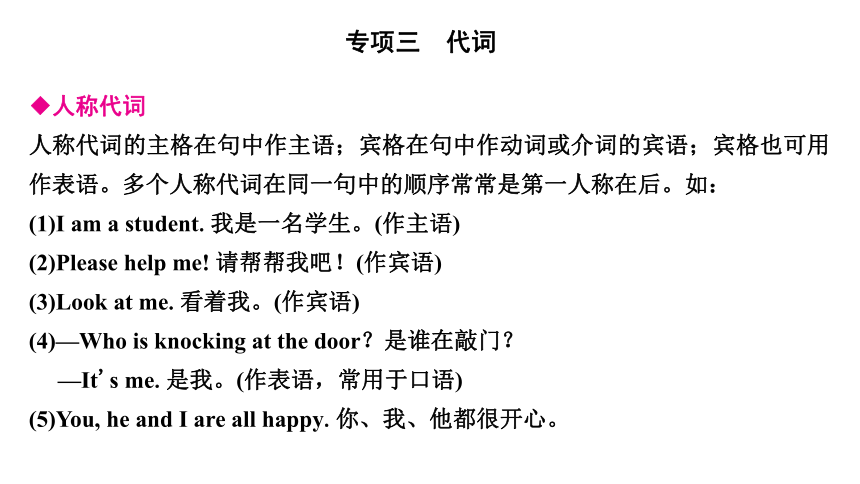
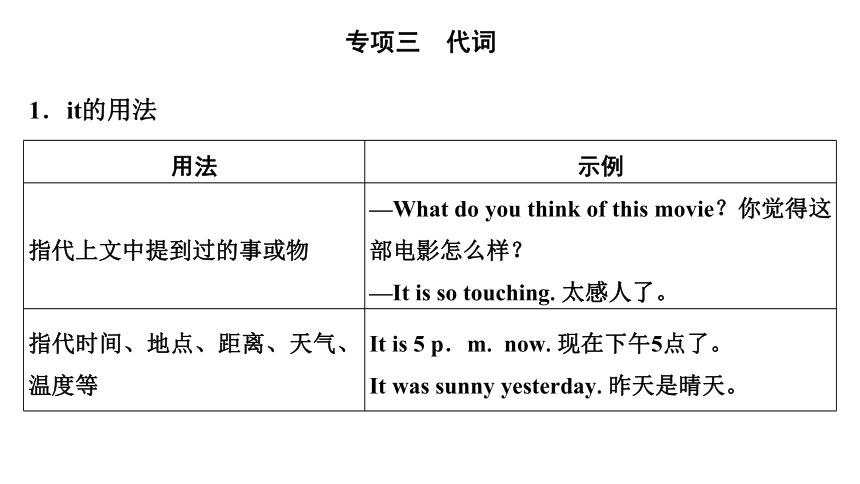
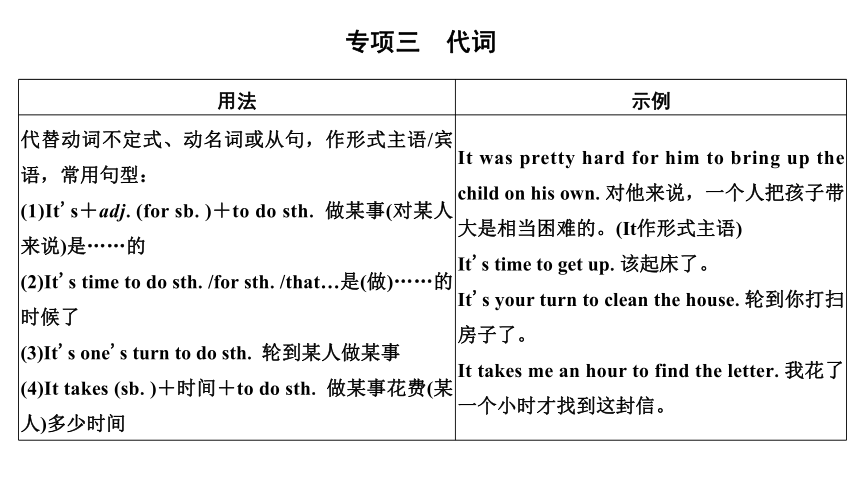
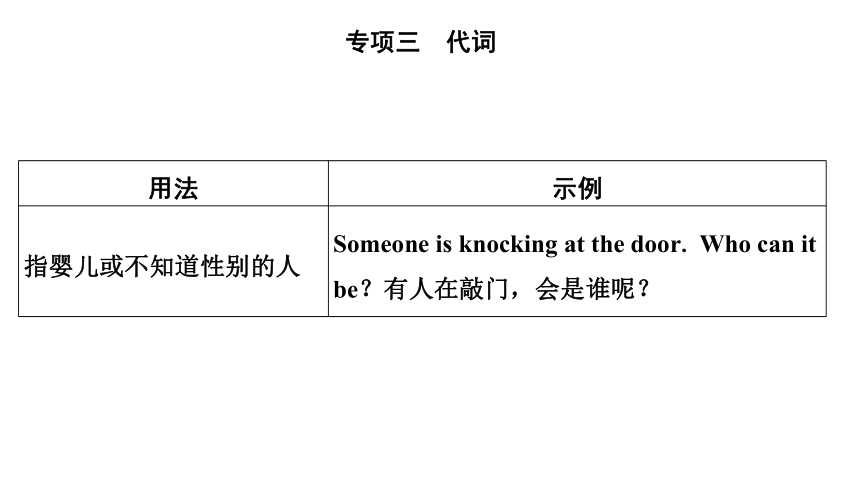

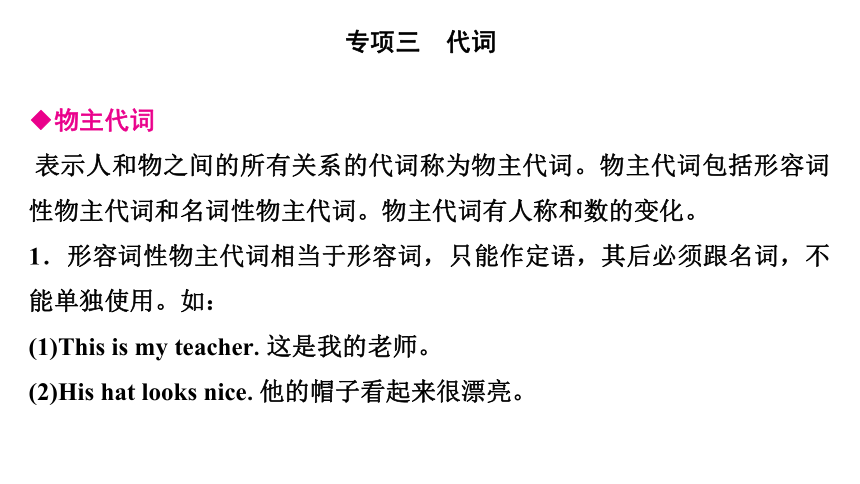
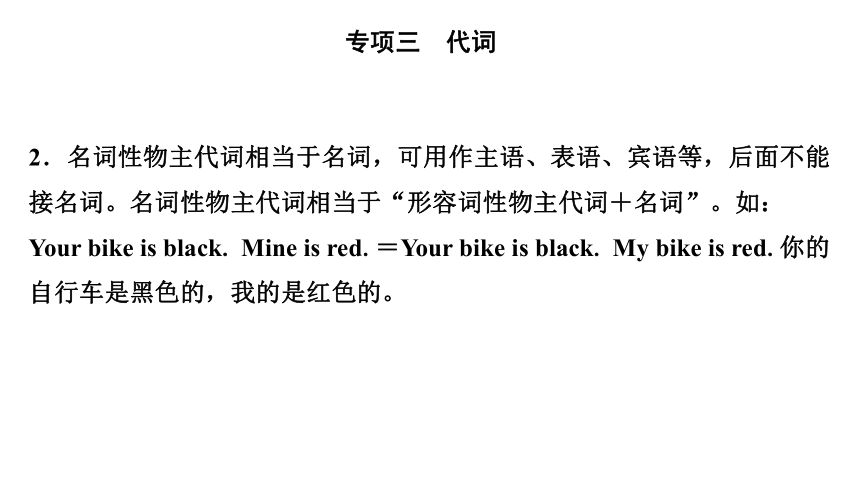
文档简介
(共73张PPT)
考点1 人称代词、物主代词和反身代词
类别 人称代词 物主代词 反身代词
主格 宾格 形容词性 名词性 第一人称 单数 I me my mine myself
复数 we us our ours ourselves
类别 人称代词 物主代词 反身代词
主格 宾格 形容词性 名词性 第二 人称 单数 you you your yours yourself
复数 you you your yours yourselves
类别 人称代词 物主代词 反身代词
主格 宾格 形容词性 名词性 第三 人称 单数 he she it him her it his her its his hers its himself
herself
itself
复数 they them their theirs themselves
◆人称代词
人称代词的主格在句中作主语;宾格在句中作动词或介词的宾语;宾格也可用作表语。多个人称代词在同一句中的顺序常常是第一人称在后。如:
(1)I am a student.我是一名学生。(作主语)
(2)Please help me! 请帮帮我吧!(作宾语)
(3)Look at me.看着我。(作宾语)
(4)—Who is knocking at the door?是谁在敲门?
—It's me.是我。(作表语,常用于口语)
(5)You, he and I are all happy.你、我、他都很开心。
1.it的用法
用法 示例
指代上文中提到过的事或物 —What do you think of this movie?你觉得这部电影怎么样?
—It is so touching.太感人了。
指代时间、地点、距离、天气、温度等 It is 5 p.m. now.现在下午5点了。
It was sunny yesterday.昨天是晴天。
用法 示例
代替动词不定式、动名词或从句,作形式主语/宾语,常用句型: (1)It's+adj.(for sb.)+to do sth. 做某事(对某人来说)是……的 (2)It's time to do sth./for sth./that…是(做)……的时候了 (3)It's one's turn to do sth. 轮到某人做某事 (4)It takes (sb.)+时间+to do sth. 做某事花费(某人)多少时间 It was pretty hard for him to bring up the child on his own.对他来说,一个人把孩子带大是相当困难的。(It作形式主语)
It's time to get up.该起床了。
It's your turn to clean the house.轮到你打扫房子了。
It takes me an hour to find the letter.我花了一个小时才找到这封信。
用法 示例
指婴儿或不知道性别的人 Someone is knocking at the door. Who can it be?有人在敲门,会是谁呢?
2.she的用法
用she 代替it 来指国家、船只、大地、月亮等,可以表示热爱、喜欢等情感。如:
(1)The moon is shining brightly tonight. She is like a round plate.今晚月色明亮。月亮就像一个圆盘子。
(2)Give the dog some water. She is thirsty.给这只狗喝点儿水。她渴了。
◆物主代词
表示人和物之间的所有关系的代词称为物主代词。物主代词包括形容词性物主代词和名词性物主代词。物主代词有人称和数的变化。
1.形容词性物主代词相当于形容词,只能作定语,其后必须跟名词,不能单独使用。如:
(1)This is my teacher.这是我的老师。
(2)His hat looks nice.他的帽子看起来很漂亮。
2.名词性物主代词相当于名词,可用作主语、表语、宾语等,后面不能接名词。名词性物主代词相当于“形容词性物主代词+名词”。如:
Your bike is black. Mine is red.=Your bike is black. My bike is red.你的自行车是黑色的,我的是红色的。
3.形容词性物主代词+own+名词,强调“属于自己的”。如:
my own car我自己的汽车
4.名词性物主代词常与of连用,作后置定语。如:
Amy is a friend of mine.艾米是我的一位朋友。
名词前有形容词性物主代词时,不能再加冠词、指示代词等限定词。如:
my a computer ×
my computer √
易错警示
◆反身代词
表示“我自己、你自己、他(她、它)自己、我们自己、你们自己、他(她、它)们自己”的代词称为反身代词。 反身代词可在句中作宾语、表语和同位语。
1.反身代词与它指代的名词或代词在人称、数、性别上要保持一致。如:
(1)Michael hurt himself.迈克尔伤到了自己。
(2)They want to finish it by themselves.他们想要自己完成它。
2.含反身代词的常用短语
by oneself单独;独自
dress oneself (in)自己穿衣服
enjoy oneself过得快乐;玩得开心
for oneself亲自;为自己
help oneself to随便吃/喝/用
lose oneself in沉浸/迷于;陶醉于
say to oneself自言自语
teach oneself=learn by oneself自学
反身代词不可单独作主语。如:
Myself bought the book. ×
I myself bought the book. √
易错警示
用适当的代词填空。
1.China is a developing country. ____(its) is in the east of Asia.
2.These new houses are so nice. ______(them) are very expensive.
3.We must clean up _____(we) classroom before going home.
4.Ling Ling is a girl. _____(her) studies in a primary school.
5.I ate all ____(I) sandwiches yesterday. Can I have one of _______(you)
It
They
our
She
my
yours
6.George has lost _____(his) pen. Ask Mary if she will lend him ______(she).
7.Jack has a dog and so have I. _____(he) dog and ______(I) had a fight.
8.The teacher wants you to return that book of _____(he).
9.Mr. and Mrs. Green and a friend of _________(they) are coming to see us.
10.Believe in __________(you) and you can make it.
his
hers
His
mine
his
theirs
yourself
考点2 指示代词
用来指代人或事物的代词称为指示代词,常见的指示代词有it,this,that,these,those。
◆辨析this/these与that/those
单数 复数 用法 例句
this these 指时间或空间上较近的人或物 This is my computer. That is yours.这是我的电脑。那是你的。
指上下文要提到的人或物 单数 复数 用法 例句
that those 指时间或空间相对较远的人或物 These apples are for us and those are for you.这些苹果是给我们的,那些是给你们的。
常用于比较结构中,代替前面提到的名词,以避免重复 指示代词可以作主语、宾语、表语、定语。如:
(1)He got up late. That's why he was late for class.(作主语)
(2)Do you know that?(作宾语)
(3)What I want to tell you is this.(作表语)
(4)I want to do it in that way.(作定语)
◆it的用法
1.特指上下文提到的对象是同一事物(同类同物);当说话人对所涉及人的身份、姓名不清楚时,常用it代替和当时某一事件、某一动作相关的那个人(注:one泛指上下文提到的同类事物中的一个,同类而不同物)
2.it作形式主语,常用于以下句型:
(1)It's adj. (for/of sb.) to do sth. 对……来说做某事是……(of前的形容词多表示品质)
(2)It's time to do/for/that… 是(做)……的时间了
(3)It seems that… 似乎……
(4)It takes/took (sb.)+时间+to do sth. 做某事花费(某人)多长时间
3.it作形式宾语,常用在find,think,make,consider,feel之后。
1.that 指代上文提及的单数可数名词或不可数名词;those指代上文提及的复数可数名词。如:
(1)The weather in Shanghai is hotter than that in Beijing.上海的天气比北京热。
(2)The students in Class 1 work harder than those in Class 2.一班的学生比二班的学生学习更努力。
易错警示
2.one和ones是泛指,指代同类中的任何一个或几个,即同类不同
物。如:
(1)I don't have a ruler. Can you lend me one?
我没有尺子,你能借我一把吗?
(2)The big fish eats little ones.大鱼吃小鱼。
3.it 和one均用于指前面提到过的单数名词,但it是特指,用于指“同一物体”。如:
—Is that your pen?那是你的钢笔吗?
—Yes,it is.是的,它是。
4.电话用语中用this指代“我”,that指代“你”。如:
—This is Tom speaking. Who's that?我是汤姆,你是谁?
—This is Mary.我是玛丽。
用适当的代词填空。
11.As for learning English, students who read a lot do much better than _______(this) who don't.
12.Jamie finds sweeping robots useful, and he decides to buy _____ for his grandma.
those
one
13.The area was very dry with low rainfall because of ________(it) geographical conditions(地理条件).
14.—How cold here!
—Yes. The weather in Harbin is much colder than ______ in your hometown.
15.She looked for her key everywhere yesterday, but she couldn't find __.
its
that
it
考点3 不定代词
◆普通不定代词
1.some,any,many,much,(a) few和(a) little
词汇 含义及用法 示例
some (1)一般用于肯定句,表示“一些”,既可以修饰可数名词,也可修饰不可数名词 (2)可以用于希望得到对方肯定回答的疑问句中,表示请求或建议 (3)“some of+…”作主语时,谓语动词根据of后面的名词确定其单复数 He has some books.他有一些书。
Would you like some milk?你想要喝点牛奶吗?
Some of the students are reading books.有些学生正在读书。
Some of the water is polluted.有些水被污染了。
词汇 含义及用法 示例
any (1)一般用于否定句和疑问句,表示 “一些”,既可以修饰可数名词,也可修饰不可数名词 (2)用在肯定句中表示“任何一个/些” He doesn't have any books.他没有书。
He is taller than any student in his class.他比班上任何一个学生都高。
词汇 含义及用法 示例
many “很多”,代替或修饰可数名词复数 I have many beautiful toys. Do you want to have a look at them 我有很多漂亮的娃娃。你想看一看吗?
much “很多”,代替或修饰不可数名词 We don't have much money.我们没有很多钱。
词汇 含义及用法 示例
few “几乎没有”,代替或修饰可数名词复数,表示否定意义 Few people know the difference between the twins.几乎没人知道这对双胞胎的区别。
a few “一些,少量”,代替或修饰可数名词复数,表示肯定意义 I have made a few friends here.我已经在这里交到了一些朋友。
词汇 含义及用法 示例
little “几乎没有”,代替或修饰不可数名词,表示否定意义 There is little water in the bottle.瓶子里几乎没有水。
a little “一些,少量”,代替或修饰不可数名词,表示肯定意义 Could you give me a little water. I'm so thirsty.能给我一点水吗?我好口渴啊。
2.both,either,neither,none和all
范围 词汇 含义及用法 示例
两者 both “两者都”,作主语时,谓语动词用复数 Both of my parents are teachers.我父母都是教师。
both…and… “……和……都”,连接并列结构作主语时,谓语动词用复数形式 Both my sister and my brother are tall.我姐姐和哥哥都很高。
范围 词汇 含义及用法 示例
两者 either “(两者中)任何一个”,作主语时,谓语动词用单数形式 —What would you like to drink Tea or Cola 你想喝点什么,茶还是可乐?
—Either is OK.都可以。
either…or… “要么……要么……”,连接并列结构作主语时,谓语动词遵循“就近原则” I want to go to either Chengdu or Chongqing to go on vacation. 我要么去成都,要么去重庆度假。
范围 词汇 含义及用法 示例
两者 neither “两者都不”,“neither of+名词/代词复数”作主语时,谓语动词通常用单数 Neither of the books is of use to me.这两本书对我都没有用。
neither…nor…“既不……也不……”,连接两个并列结构作主语时,谓语动词遵循“就近原则” Neither Liz nor I am a student. 利兹和我都不是学生。
范围 词汇 含义及用法 示例
三 者 及 三 者 以 上 all 指三者及以上“都”,后可直接跟名词,也可跟of,谓语动词的单复数受其后名词的影响 We are all students.我们都是学生。
All of the students come from wealthy families.所有的学生来自富裕的家庭。
none “(三者及以上)没有一个”,代替不可数名词作主语时,谓语动词用单数;代替可数名词复数作主语时,谓语动词用单复数均可 None of the answers is/are right. 没有一个答案是对的。
辨析no one与none
词汇 用法 示例
no one 只指人,只表单数可数概念,谓语动词用单数,不可以与of短语连用,不强调数量,常用来回答以Who开头的疑问句 No one is good at maths.没人擅长数学。
No one has arrived yet. 还没有人到。
—Who knows the answer to the question?谁知道这个问题的答案?
—No one.没有人。
辨析异同
词汇 用法 示例
none 既可指人又可指物,后接可数、不可数名词均可,代替不可数名词作主语时,谓语动词用单数;代替可数名词作主语时,谓语动词用单复数均可,可与of短语连用,强调数量,常用来回答以How many/How much开头的疑问句 English is the first language in none of these countries.这些国家中没有一个第一语言是英语的。
None of the problems is/are easy to solve.这些问题没有一个是容易解决的。
—How many students in your class have been to Beijing?你们班有多少学生去过北京?
—None.一个都没有。
3.each和every
词汇 含义及用法 示例
each (1)指两者或两者以上的人或事物中的“每一个”,强调个体 (2)可以和of连用,用作主语、宾语、定语等,可单独使用 There are some trees on each side of the road.路的两边都有一些树。
Each of us has an umbrella.我们每人都有一把伞。
词汇 含义及用法 示例
every (1)指三者或三者以上的人或事物中的“每一个”,强调整体 (2)仅用作定语,不可单独使用,不可以和of连用 (3)有“每,每隔”的意思,表示频率 Every student in the school has a bike.学校里的每个学生都有一辆自行车。
every two years每隔两年
each作主语时,谓语动词用单数;every修饰名词作主语时,谓语动词用单数。
易错警示
4.another,other,others,the other与the others
词汇 含义及用法 示例
another 泛指“(不定数目中的)另一个”,可用作定语,后接可数名词单数 He is still hungry and he eats another cake.他还是很饿,就又吃了一块蛋糕。
可以用在“数词+名词复数”前,意为“又;再”,可与“数词+more+名词复数”转换 There are another twenty trees to plant today.= There are twenty more trees to plant today.今天还有二十棵树要栽。
词汇 含义及用法 示例
other 泛指“另外的……,其他的……”,一般用作定语,后加可数名词复数或不可数名词 What can we do with other cloth?我们能用另外的布做什么?
other+可数名词复数=others(别的人或物) other students=others其他学生
词汇 含义及用法 示例
others 泛指“其他的人或物”,常与some连用,构成“some…others…”句型,意为“一些……,另一些……” Some students are reading books. Others are doing their homework.一些学生在读书,另一些学生在做作业。
词汇 含义及用法 示例
the other 特指“(两者中的)另一个人或物”,常与one连用,构成“one…the other…”句型,表示“一个……另一个……” I have two sisters. One is a teacher, the other is a doctor.我有两个姐姐,一个是教师,另一个是医生。
the others 特指“其余所有的人或物”,相当于“the other+名词复数”,不能作定语 Tom stayed at home. The others went out to have fun.汤姆待在家里,别人都出去玩了。
◆复合不定代词
由some-,any-,every-,no-与-one,-body,-thing合起来构成的不定代词叫复合不定代词。常见的复合不定代词有:
-body somebody 某人 anybody 任何人 everybody 每个人 nobody
没有人
-one someone 某人 anyone 任何人 everyone 每个人 no one
没有人
-thing something 某事/物 anything 任何事情 everything 每件事 nothing
没有任何事
1.复合不定代词只能作主语、宾语和表语,不能作定语。作主语时,谓语动词一般用单数。如:
(1)Is everyone here?每个人都到了吗?
(2)Someone is calling for help.有人正在呼救。
2.修饰复合不定代词的单词或短语要放其后。如:
something interesting一些有趣的事(形容词修饰复合不定代词)
nothing to do无事可做(动词不定式修饰复合不定代词)
Anything else?还有别的什么吗?
3.复合不定代词的用法
代词 含义及用法 例句
something 意为“某事;某物”,通常用在肯定句中,还可以用在表示邀请、请求或希望得到肯定回答的一般疑问句中 There is something wrong with my cellphone.我的手机出了点问题。
—Would you like to drink something 你想喝点什么吗?
—Yes. I would like to have a cup of coffee.是的,我想来一杯咖啡。
代词 含义及用法 例句
somebody 意为“某人” I heard somebody singing outside.我听到外面有人唱歌。
意为“重要人物;大人物” I want to be somebody in the future.我未来想成为一名大人物。
代词 含义及用法 例句
anything 意为“某事;某物”,通常用在否定句或疑问句中 What happened Is anything wrong 发生什么事了?有什么问题吗?
用在肯定句中,表示“任何事情;任何东西” You can say anything you want to say.你可以说任何你想说的。
代词 含义及用法 例句
nothing 意为“没有任何东西;没有任何事”,相当于not…anything I want to do nothing today.=I don't want to do anything today.我今天什么事情都不想做。
代词 含义及用法 例句
nobody 意为“没有人” Nobody wants to make friends with him.没人想和他做朋友。
意为“无名之辈;小人物” I'm nobody. 我只是一个无名之辈。
everything 意为“所有东西;每件事” How is everything going 一切都好吗?
4.复合不定代词的常用句型
(1)There is something wrong with…意为“……出问题了”。如:
There is something wrong with my computer.我的电脑出问题了。
(2)…has something/nothing to do with…意为“……与……有关”。如:
This matter has nothing to do with me.这件事与我无关。
(3)sb.can do nothing but…意为“某人除了……什么都不能做”。如:
He can do nothing but wait.他除了等待什么也做不了。
从方框中选择适当的代词填空。
another one none other each neither all any both either
16.We have two more classes._____ is physics, the other is politics.
17.—Which dress do you prefer, the red one or the green one
—_________. I like blue.
One
Neither
18.—There are mainly six kinds of tea in China. Which is your favourite
—Green tea, I guess. I've tried black tea, green tea and so on, and _____ of them have their special tastes.
19.The two books are ______ about English. You can choose either of them to read.
20.I read two reports yesterday. One is about the Three-child Policy(政策), and the _______ is about Mars exploration(探测).
all
both
other
21.Four children were walking under a small umbrella. ______ of them got wet.
22.We need some more paint, but there isn't _____ left.
23.Matter(物质) is always changing, ________ physically or chemically.
24.__________ good example of how nature is good for health comes from Canada.
25.We throw tons of rubbish away _________ year, and we have to make a change.
any
None
either
Another
each
从方框中选择适当的复合不定代词填空。
everybody nobody something everything anything nothing
26.The poor boy hasn't eaten __________ for a whole day.
27.Then that person does ___________ nice for someone else.
28.___________ can help build a greener country.
anything
something
Everybody
29.________ knows for sure whether the theory is true or not, but it's a fact that bees are disappearing in very large numbers.
30.Keep ____________ quiet when you are trying to sleep.
31.We should do _________ but passively wait for something to be achieved.
Nobody
everything
nothing
考点4 疑问代词
疑问代词引导特殊疑问句,一般放在句首,在句子中充当主语、表语、宾语或定语。疑问代词有who,whom,whose,what,which。
疑问代词 用法 例句
who 对人称代词主格和宾格进行提问 Who is your English teacher?你们的英语老师是谁?
whom 对人称代词宾格进行提问 Whom did you meet on the street?你在街上遇到了谁?
疑问代词 用法 例句
whose 对物主代词进行提问,也可放在名词前作定语 Whose is this book?=Whose book is this?这是谁的书?
what 对具体内容进行提问 What language do you like best?你最喜欢什么语言?
which 对指定范围内的“哪个”进行提问 Which language do you like best, Chinese, English or Japanese
你最喜欢哪种语言,汉语、英语还是日语?
易错警示
1.疑问代词作主语时,通常使用陈述语序,谓语动词往往用单数形式。如:
What is in the box?盒子里有什么?
2.who,what作表语(指人)时的区别:who询问身份,what询问职业。如:
(1) —Who is the man in black?那个穿黑衣服的男子是谁?
—He is my uncle.他是我叔叔。
(2)—What is the man in black?那个穿黑衣服的男子是干什么的?
—He is a doctor.他是个医生。
1.所有疑问代词都可以用作连接代词,引导宾语从句。如:
(1)My question is who will be our English teacher.
我的问题是,谁会成为我们的英语老师。
(2)Please make sure whose book it is.
请你确认一下这是谁的书。
知识拓展
(3)Our teacher told us which university was the best.
我们老师告诉我们哪所大学是最好的。
(4)We really don't know what happened.我们真的不知道发生了什么。
2.除what以外的疑问代词都可以作关系代词,引导定语从句。其中who,whom指代人,which指代物,that可指代人或物,whose指代“某人的或某物的”。如:
(1)This is the student who/that fell down from the chair.
这就是那个从椅子上摔下来的学生。
(2)Football is a game which is liked by most boys.
足球是一项被大多数男孩儿热爱的运动。
(3)This is one of the most exciting football games that I have ever seen. 这是我见过的最激动人心的足球比赛之一。
(4)This is the woman scientist whose name is known all over the country.这是一位被整个国家所熟知的女科学家。
含what的常考句型
1.询问意见
(1)What about…?
(2)What do you think of…?
(3)What would you like to…?
知识拓展
2.询问职业
(1)What is sb.
(2)What does sb.do
3.询问外貌
What does sb.look like
4.询问性格
What is sb.like
5.询问天气
What is the weather like?=How is the weather
从方框中选择合适的词填空。
what who whom whose
32.However, he finds no problem talking with his Chinese colleagues, many of _______ speak good English.
33.It helps people remember ______ once happened such as dreams, friendships and happiness.
whom
what
34.Those _____ never did well in school needn't worry.
35.It was found by a logger—a person _______ job is to cut down trees.
36.My sister is only six, but _____(she) can already help with some housework.
37.—Whose camera is this Is it _______(you)
—No, it's not mine. It's _____(he).
who
whose
she
yours
his
考点1 人称代词、物主代词和反身代词
类别 人称代词 物主代词 反身代词
主格 宾格 形容词性 名词性 第一人称 单数 I me my mine myself
复数 we us our ours ourselves
类别 人称代词 物主代词 反身代词
主格 宾格 形容词性 名词性 第二 人称 单数 you you your yours yourself
复数 you you your yours yourselves
类别 人称代词 物主代词 反身代词
主格 宾格 形容词性 名词性 第三 人称 单数 he she it him her it his her its his hers its himself
herself
itself
复数 they them their theirs themselves
◆人称代词
人称代词的主格在句中作主语;宾格在句中作动词或介词的宾语;宾格也可用作表语。多个人称代词在同一句中的顺序常常是第一人称在后。如:
(1)I am a student.我是一名学生。(作主语)
(2)Please help me! 请帮帮我吧!(作宾语)
(3)Look at me.看着我。(作宾语)
(4)—Who is knocking at the door?是谁在敲门?
—It's me.是我。(作表语,常用于口语)
(5)You, he and I are all happy.你、我、他都很开心。
1.it的用法
用法 示例
指代上文中提到过的事或物 —What do you think of this movie?你觉得这部电影怎么样?
—It is so touching.太感人了。
指代时间、地点、距离、天气、温度等 It is 5 p.m. now.现在下午5点了。
It was sunny yesterday.昨天是晴天。
用法 示例
代替动词不定式、动名词或从句,作形式主语/宾语,常用句型: (1)It's+adj.(for sb.)+to do sth. 做某事(对某人来说)是……的 (2)It's time to do sth./for sth./that…是(做)……的时候了 (3)It's one's turn to do sth. 轮到某人做某事 (4)It takes (sb.)+时间+to do sth. 做某事花费(某人)多少时间 It was pretty hard for him to bring up the child on his own.对他来说,一个人把孩子带大是相当困难的。(It作形式主语)
It's time to get up.该起床了。
It's your turn to clean the house.轮到你打扫房子了。
It takes me an hour to find the letter.我花了一个小时才找到这封信。
用法 示例
指婴儿或不知道性别的人 Someone is knocking at the door. Who can it be?有人在敲门,会是谁呢?
2.she的用法
用she 代替it 来指国家、船只、大地、月亮等,可以表示热爱、喜欢等情感。如:
(1)The moon is shining brightly tonight. She is like a round plate.今晚月色明亮。月亮就像一个圆盘子。
(2)Give the dog some water. She is thirsty.给这只狗喝点儿水。她渴了。
◆物主代词
表示人和物之间的所有关系的代词称为物主代词。物主代词包括形容词性物主代词和名词性物主代词。物主代词有人称和数的变化。
1.形容词性物主代词相当于形容词,只能作定语,其后必须跟名词,不能单独使用。如:
(1)This is my teacher.这是我的老师。
(2)His hat looks nice.他的帽子看起来很漂亮。
2.名词性物主代词相当于名词,可用作主语、表语、宾语等,后面不能接名词。名词性物主代词相当于“形容词性物主代词+名词”。如:
Your bike is black. Mine is red.=Your bike is black. My bike is red.你的自行车是黑色的,我的是红色的。
3.形容词性物主代词+own+名词,强调“属于自己的”。如:
my own car我自己的汽车
4.名词性物主代词常与of连用,作后置定语。如:
Amy is a friend of mine.艾米是我的一位朋友。
名词前有形容词性物主代词时,不能再加冠词、指示代词等限定词。如:
my a computer ×
my computer √
易错警示
◆反身代词
表示“我自己、你自己、他(她、它)自己、我们自己、你们自己、他(她、它)们自己”的代词称为反身代词。 反身代词可在句中作宾语、表语和同位语。
1.反身代词与它指代的名词或代词在人称、数、性别上要保持一致。如:
(1)Michael hurt himself.迈克尔伤到了自己。
(2)They want to finish it by themselves.他们想要自己完成它。
2.含反身代词的常用短语
by oneself单独;独自
dress oneself (in)自己穿衣服
enjoy oneself过得快乐;玩得开心
for oneself亲自;为自己
help oneself to随便吃/喝/用
lose oneself in沉浸/迷于;陶醉于
say to oneself自言自语
teach oneself=learn by oneself自学
反身代词不可单独作主语。如:
Myself bought the book. ×
I myself bought the book. √
易错警示
用适当的代词填空。
1.China is a developing country. ____(its) is in the east of Asia.
2.These new houses are so nice. ______(them) are very expensive.
3.We must clean up _____(we) classroom before going home.
4.Ling Ling is a girl. _____(her) studies in a primary school.
5.I ate all ____(I) sandwiches yesterday. Can I have one of _______(you)
It
They
our
She
my
yours
6.George has lost _____(his) pen. Ask Mary if she will lend him ______(she).
7.Jack has a dog and so have I. _____(he) dog and ______(I) had a fight.
8.The teacher wants you to return that book of _____(he).
9.Mr. and Mrs. Green and a friend of _________(they) are coming to see us.
10.Believe in __________(you) and you can make it.
his
hers
His
mine
his
theirs
yourself
考点2 指示代词
用来指代人或事物的代词称为指示代词,常见的指示代词有it,this,that,these,those。
◆辨析this/these与that/those
单数 复数 用法 例句
this these 指时间或空间上较近的人或物 This is my computer. That is yours.这是我的电脑。那是你的。
指上下文要提到的人或物 单数 复数 用法 例句
that those 指时间或空间相对较远的人或物 These apples are for us and those are for you.这些苹果是给我们的,那些是给你们的。
常用于比较结构中,代替前面提到的名词,以避免重复 指示代词可以作主语、宾语、表语、定语。如:
(1)He got up late. That's why he was late for class.(作主语)
(2)Do you know that?(作宾语)
(3)What I want to tell you is this.(作表语)
(4)I want to do it in that way.(作定语)
◆it的用法
1.特指上下文提到的对象是同一事物(同类同物);当说话人对所涉及人的身份、姓名不清楚时,常用it代替和当时某一事件、某一动作相关的那个人(注:one泛指上下文提到的同类事物中的一个,同类而不同物)
2.it作形式主语,常用于以下句型:
(1)It's adj. (for/of sb.) to do sth. 对……来说做某事是……(of前的形容词多表示品质)
(2)It's time to do/for/that… 是(做)……的时间了
(3)It seems that… 似乎……
(4)It takes/took (sb.)+时间+to do sth. 做某事花费(某人)多长时间
3.it作形式宾语,常用在find,think,make,consider,feel之后。
1.that 指代上文提及的单数可数名词或不可数名词;those指代上文提及的复数可数名词。如:
(1)The weather in Shanghai is hotter than that in Beijing.上海的天气比北京热。
(2)The students in Class 1 work harder than those in Class 2.一班的学生比二班的学生学习更努力。
易错警示
2.one和ones是泛指,指代同类中的任何一个或几个,即同类不同
物。如:
(1)I don't have a ruler. Can you lend me one?
我没有尺子,你能借我一把吗?
(2)The big fish eats little ones.大鱼吃小鱼。
3.it 和one均用于指前面提到过的单数名词,但it是特指,用于指“同一物体”。如:
—Is that your pen?那是你的钢笔吗?
—Yes,it is.是的,它是。
4.电话用语中用this指代“我”,that指代“你”。如:
—This is Tom speaking. Who's that?我是汤姆,你是谁?
—This is Mary.我是玛丽。
用适当的代词填空。
11.As for learning English, students who read a lot do much better than _______(this) who don't.
12.Jamie finds sweeping robots useful, and he decides to buy _____ for his grandma.
those
one
13.The area was very dry with low rainfall because of ________(it) geographical conditions(地理条件).
14.—How cold here!
—Yes. The weather in Harbin is much colder than ______ in your hometown.
15.She looked for her key everywhere yesterday, but she couldn't find __.
its
that
it
考点3 不定代词
◆普通不定代词
1.some,any,many,much,(a) few和(a) little
词汇 含义及用法 示例
some (1)一般用于肯定句,表示“一些”,既可以修饰可数名词,也可修饰不可数名词 (2)可以用于希望得到对方肯定回答的疑问句中,表示请求或建议 (3)“some of+…”作主语时,谓语动词根据of后面的名词确定其单复数 He has some books.他有一些书。
Would you like some milk?你想要喝点牛奶吗?
Some of the students are reading books.有些学生正在读书。
Some of the water is polluted.有些水被污染了。
词汇 含义及用法 示例
any (1)一般用于否定句和疑问句,表示 “一些”,既可以修饰可数名词,也可修饰不可数名词 (2)用在肯定句中表示“任何一个/些” He doesn't have any books.他没有书。
He is taller than any student in his class.他比班上任何一个学生都高。
词汇 含义及用法 示例
many “很多”,代替或修饰可数名词复数 I have many beautiful toys. Do you want to have a look at them 我有很多漂亮的娃娃。你想看一看吗?
much “很多”,代替或修饰不可数名词 We don't have much money.我们没有很多钱。
词汇 含义及用法 示例
few “几乎没有”,代替或修饰可数名词复数,表示否定意义 Few people know the difference between the twins.几乎没人知道这对双胞胎的区别。
a few “一些,少量”,代替或修饰可数名词复数,表示肯定意义 I have made a few friends here.我已经在这里交到了一些朋友。
词汇 含义及用法 示例
little “几乎没有”,代替或修饰不可数名词,表示否定意义 There is little water in the bottle.瓶子里几乎没有水。
a little “一些,少量”,代替或修饰不可数名词,表示肯定意义 Could you give me a little water. I'm so thirsty.能给我一点水吗?我好口渴啊。
2.both,either,neither,none和all
范围 词汇 含义及用法 示例
两者 both “两者都”,作主语时,谓语动词用复数 Both of my parents are teachers.我父母都是教师。
both…and… “……和……都”,连接并列结构作主语时,谓语动词用复数形式 Both my sister and my brother are tall.我姐姐和哥哥都很高。
范围 词汇 含义及用法 示例
两者 either “(两者中)任何一个”,作主语时,谓语动词用单数形式 —What would you like to drink Tea or Cola 你想喝点什么,茶还是可乐?
—Either is OK.都可以。
either…or… “要么……要么……”,连接并列结构作主语时,谓语动词遵循“就近原则” I want to go to either Chengdu or Chongqing to go on vacation. 我要么去成都,要么去重庆度假。
范围 词汇 含义及用法 示例
两者 neither “两者都不”,“neither of+名词/代词复数”作主语时,谓语动词通常用单数 Neither of the books is of use to me.这两本书对我都没有用。
neither…nor…“既不……也不……”,连接两个并列结构作主语时,谓语动词遵循“就近原则” Neither Liz nor I am a student. 利兹和我都不是学生。
范围 词汇 含义及用法 示例
三 者 及 三 者 以 上 all 指三者及以上“都”,后可直接跟名词,也可跟of,谓语动词的单复数受其后名词的影响 We are all students.我们都是学生。
All of the students come from wealthy families.所有的学生来自富裕的家庭。
none “(三者及以上)没有一个”,代替不可数名词作主语时,谓语动词用单数;代替可数名词复数作主语时,谓语动词用单复数均可 None of the answers is/are right. 没有一个答案是对的。
辨析no one与none
词汇 用法 示例
no one 只指人,只表单数可数概念,谓语动词用单数,不可以与of短语连用,不强调数量,常用来回答以Who开头的疑问句 No one is good at maths.没人擅长数学。
No one has arrived yet. 还没有人到。
—Who knows the answer to the question?谁知道这个问题的答案?
—No one.没有人。
辨析异同
词汇 用法 示例
none 既可指人又可指物,后接可数、不可数名词均可,代替不可数名词作主语时,谓语动词用单数;代替可数名词作主语时,谓语动词用单复数均可,可与of短语连用,强调数量,常用来回答以How many/How much开头的疑问句 English is the first language in none of these countries.这些国家中没有一个第一语言是英语的。
None of the problems is/are easy to solve.这些问题没有一个是容易解决的。
—How many students in your class have been to Beijing?你们班有多少学生去过北京?
—None.一个都没有。
3.each和every
词汇 含义及用法 示例
each (1)指两者或两者以上的人或事物中的“每一个”,强调个体 (2)可以和of连用,用作主语、宾语、定语等,可单独使用 There are some trees on each side of the road.路的两边都有一些树。
Each of us has an umbrella.我们每人都有一把伞。
词汇 含义及用法 示例
every (1)指三者或三者以上的人或事物中的“每一个”,强调整体 (2)仅用作定语,不可单独使用,不可以和of连用 (3)有“每,每隔”的意思,表示频率 Every student in the school has a bike.学校里的每个学生都有一辆自行车。
every two years每隔两年
each作主语时,谓语动词用单数;every修饰名词作主语时,谓语动词用单数。
易错警示
4.another,other,others,the other与the others
词汇 含义及用法 示例
another 泛指“(不定数目中的)另一个”,可用作定语,后接可数名词单数 He is still hungry and he eats another cake.他还是很饿,就又吃了一块蛋糕。
可以用在“数词+名词复数”前,意为“又;再”,可与“数词+more+名词复数”转换 There are another twenty trees to plant today.= There are twenty more trees to plant today.今天还有二十棵树要栽。
词汇 含义及用法 示例
other 泛指“另外的……,其他的……”,一般用作定语,后加可数名词复数或不可数名词 What can we do with other cloth?我们能用另外的布做什么?
other+可数名词复数=others(别的人或物) other students=others其他学生
词汇 含义及用法 示例
others 泛指“其他的人或物”,常与some连用,构成“some…others…”句型,意为“一些……,另一些……” Some students are reading books. Others are doing their homework.一些学生在读书,另一些学生在做作业。
词汇 含义及用法 示例
the other 特指“(两者中的)另一个人或物”,常与one连用,构成“one…the other…”句型,表示“一个……另一个……” I have two sisters. One is a teacher, the other is a doctor.我有两个姐姐,一个是教师,另一个是医生。
the others 特指“其余所有的人或物”,相当于“the other+名词复数”,不能作定语 Tom stayed at home. The others went out to have fun.汤姆待在家里,别人都出去玩了。
◆复合不定代词
由some-,any-,every-,no-与-one,-body,-thing合起来构成的不定代词叫复合不定代词。常见的复合不定代词有:
-body somebody 某人 anybody 任何人 everybody 每个人 nobody
没有人
-one someone 某人 anyone 任何人 everyone 每个人 no one
没有人
-thing something 某事/物 anything 任何事情 everything 每件事 nothing
没有任何事
1.复合不定代词只能作主语、宾语和表语,不能作定语。作主语时,谓语动词一般用单数。如:
(1)Is everyone here?每个人都到了吗?
(2)Someone is calling for help.有人正在呼救。
2.修饰复合不定代词的单词或短语要放其后。如:
something interesting一些有趣的事(形容词修饰复合不定代词)
nothing to do无事可做(动词不定式修饰复合不定代词)
Anything else?还有别的什么吗?
3.复合不定代词的用法
代词 含义及用法 例句
something 意为“某事;某物”,通常用在肯定句中,还可以用在表示邀请、请求或希望得到肯定回答的一般疑问句中 There is something wrong with my cellphone.我的手机出了点问题。
—Would you like to drink something 你想喝点什么吗?
—Yes. I would like to have a cup of coffee.是的,我想来一杯咖啡。
代词 含义及用法 例句
somebody 意为“某人” I heard somebody singing outside.我听到外面有人唱歌。
意为“重要人物;大人物” I want to be somebody in the future.我未来想成为一名大人物。
代词 含义及用法 例句
anything 意为“某事;某物”,通常用在否定句或疑问句中 What happened Is anything wrong 发生什么事了?有什么问题吗?
用在肯定句中,表示“任何事情;任何东西” You can say anything you want to say.你可以说任何你想说的。
代词 含义及用法 例句
nothing 意为“没有任何东西;没有任何事”,相当于not…anything I want to do nothing today.=I don't want to do anything today.我今天什么事情都不想做。
代词 含义及用法 例句
nobody 意为“没有人” Nobody wants to make friends with him.没人想和他做朋友。
意为“无名之辈;小人物” I'm nobody. 我只是一个无名之辈。
everything 意为“所有东西;每件事” How is everything going 一切都好吗?
4.复合不定代词的常用句型
(1)There is something wrong with…意为“……出问题了”。如:
There is something wrong with my computer.我的电脑出问题了。
(2)…has something/nothing to do with…意为“……与……有关”。如:
This matter has nothing to do with me.这件事与我无关。
(3)sb.can do nothing but…意为“某人除了……什么都不能做”。如:
He can do nothing but wait.他除了等待什么也做不了。
从方框中选择适当的代词填空。
another one none other each neither all any both either
16.We have two more classes._____ is physics, the other is politics.
17.—Which dress do you prefer, the red one or the green one
—_________. I like blue.
One
Neither
18.—There are mainly six kinds of tea in China. Which is your favourite
—Green tea, I guess. I've tried black tea, green tea and so on, and _____ of them have their special tastes.
19.The two books are ______ about English. You can choose either of them to read.
20.I read two reports yesterday. One is about the Three-child Policy(政策), and the _______ is about Mars exploration(探测).
all
both
other
21.Four children were walking under a small umbrella. ______ of them got wet.
22.We need some more paint, but there isn't _____ left.
23.Matter(物质) is always changing, ________ physically or chemically.
24.__________ good example of how nature is good for health comes from Canada.
25.We throw tons of rubbish away _________ year, and we have to make a change.
any
None
either
Another
each
从方框中选择适当的复合不定代词填空。
everybody nobody something everything anything nothing
26.The poor boy hasn't eaten __________ for a whole day.
27.Then that person does ___________ nice for someone else.
28.___________ can help build a greener country.
anything
something
Everybody
29.________ knows for sure whether the theory is true or not, but it's a fact that bees are disappearing in very large numbers.
30.Keep ____________ quiet when you are trying to sleep.
31.We should do _________ but passively wait for something to be achieved.
Nobody
everything
nothing
考点4 疑问代词
疑问代词引导特殊疑问句,一般放在句首,在句子中充当主语、表语、宾语或定语。疑问代词有who,whom,whose,what,which。
疑问代词 用法 例句
who 对人称代词主格和宾格进行提问 Who is your English teacher?你们的英语老师是谁?
whom 对人称代词宾格进行提问 Whom did you meet on the street?你在街上遇到了谁?
疑问代词 用法 例句
whose 对物主代词进行提问,也可放在名词前作定语 Whose is this book?=Whose book is this?这是谁的书?
what 对具体内容进行提问 What language do you like best?你最喜欢什么语言?
which 对指定范围内的“哪个”进行提问 Which language do you like best, Chinese, English or Japanese
你最喜欢哪种语言,汉语、英语还是日语?
易错警示
1.疑问代词作主语时,通常使用陈述语序,谓语动词往往用单数形式。如:
What is in the box?盒子里有什么?
2.who,what作表语(指人)时的区别:who询问身份,what询问职业。如:
(1) —Who is the man in black?那个穿黑衣服的男子是谁?
—He is my uncle.他是我叔叔。
(2)—What is the man in black?那个穿黑衣服的男子是干什么的?
—He is a doctor.他是个医生。
1.所有疑问代词都可以用作连接代词,引导宾语从句。如:
(1)My question is who will be our English teacher.
我的问题是,谁会成为我们的英语老师。
(2)Please make sure whose book it is.
请你确认一下这是谁的书。
知识拓展
(3)Our teacher told us which university was the best.
我们老师告诉我们哪所大学是最好的。
(4)We really don't know what happened.我们真的不知道发生了什么。
2.除what以外的疑问代词都可以作关系代词,引导定语从句。其中who,whom指代人,which指代物,that可指代人或物,whose指代“某人的或某物的”。如:
(1)This is the student who/that fell down from the chair.
这就是那个从椅子上摔下来的学生。
(2)Football is a game which is liked by most boys.
足球是一项被大多数男孩儿热爱的运动。
(3)This is one of the most exciting football games that I have ever seen. 这是我见过的最激动人心的足球比赛之一。
(4)This is the woman scientist whose name is known all over the country.这是一位被整个国家所熟知的女科学家。
含what的常考句型
1.询问意见
(1)What about…?
(2)What do you think of…?
(3)What would you like to…?
知识拓展
2.询问职业
(1)What is sb.
(2)What does sb.do
3.询问外貌
What does sb.look like
4.询问性格
What is sb.like
5.询问天气
What is the weather like?=How is the weather
从方框中选择合适的词填空。
what who whom whose
32.However, he finds no problem talking with his Chinese colleagues, many of _______ speak good English.
33.It helps people remember ______ once happened such as dreams, friendships and happiness.
whom
what
34.Those _____ never did well in school needn't worry.
35.It was found by a logger—a person _______ job is to cut down trees.
36.My sister is only six, but _____(she) can already help with some housework.
37.—Whose camera is this Is it _______(you)
—No, it's not mine. It's _____(he).
who
whose
she
yours
his
同课章节目录
- 词法
- 名词
- 动词和动词短语
- 动词语态
- 动词时态
- 助动词和情态动词
- 非谓语动词
- 冠词
- 代词
- 数词和量词
- 形容词副词及其比较等级
- 介词和介词短语
- 连词和感叹词
- 构词法
- 相似、相近词比较
- 句法
- 陈述句
- 一般疑问句和否定疑问句
- 特殊疑问句及选择疑问句
- 反意疑问句
- 存在句(There be句型)
- 宾语从句
- 定语从句
- 状语从句
- 主谓一致问题
- 简单句
- 并列句
- 复合句
- 主谓一致
- 主、表语从句
- 名词性从句
- 直接引语和间接引语
- 虚拟语气
- 感叹句
- 强调句
- 倒装句
- 祈使句
- 句子的成分
- 句子的分类
- 题型专区
- 单项选择部分
- 易错题
- 完形填空
- 阅读理解
- 词汇练习
- 听说训练
- 句型转换
- 补全对话
- 短文改错
- 翻译
- 书面表达
- 任务型阅读
- 语法填空
- 其他资料
